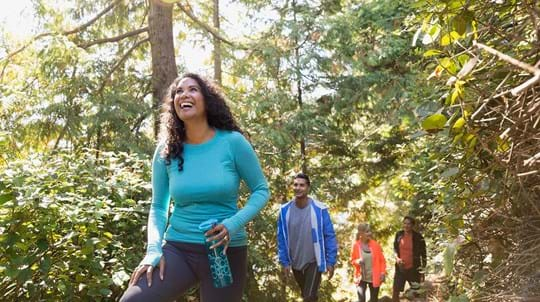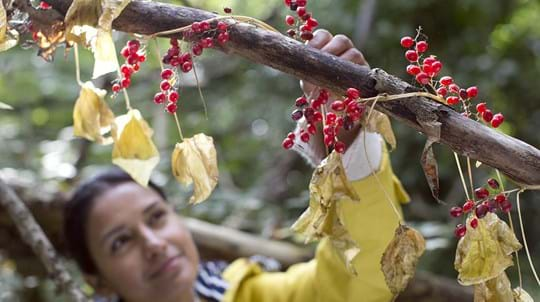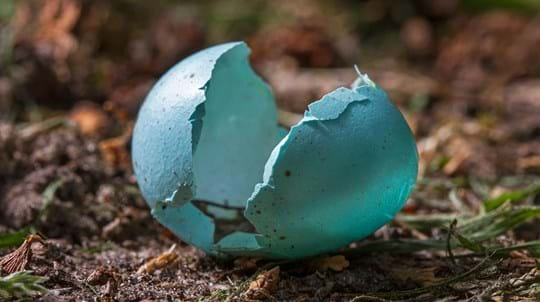
Visiting woods
Walking dogs in our woods
Dogs are welcome for walkies in our woods. Take a look at our tips and guidelines for ensuring we keep our woods safe and special for dogs and wildlife.
Viewing in: English
Our woods are home to amazing plants and animals - often harbouring endangered and fragile native wildlife - and they're all free for people to enjoy responsibly. Help keep them safe for tomorrow by following these top tips for your visit.

Protect fragile wild flowers like bluebells, and ground-nesting wildlife such as skylarks and woodcocks, by sticking to the paths. You’ll allow precious seeds to grow, prevent plants being trampled and stop the woodland floor becoming bare and muddy.

Protect the plants and animals that call the wood home. Keeping your dog close prevents them accidentally trampling on birds’ nests and disturbing other wildlife, livestock and visitors.

Dog mess is unsightly, spreads diseases to animals and people, damages the soil and it’s horrible to clean off your shoes. Keep woods clean and healthy by taking your dog’s poo home.

Wildfires can destroy habitats, kill wildlife and put people's lives at risk. Bring a picnic to enjoy instead of lighting a fire, and leave your BBQ at home.

Setting up camp crushes delicate plants and disturbs these woodland havens. Leave the sleepovers to the wildlife.

Routes to our woods are used by neighbours, farmers and emergency vehicles. If there’s nowhere to park considerately, come back another time.

The ground you're cycling on is an essential part of a healthy woodland. Mountain biking in the wrong place damages this, leaving the woodland floor bare and muddy. Check for guidance before you visit. Make sure you only ride on the designated paths.

Water habitats are home to birds and other creatures which are an important part of the woodland ecosystem and need peace and quiet to thrive. They are damaged by people and dogs entering the water. Leave swimming to the wildlife.

Voles, amphibians and other wildlife can get trapped in or poisoned by litter. We don’t have rangers or fairies to clear it up. Removal costs money that could be better spent on managing our woods or planting more trees. Take your litter home.

Natural crags are special places. Climbing on them erodes fragile surfaces, destroys precious habitats and can be harmful to the wildlife that shelters there. Choose to protect these crags by getting permission before you go.

Little feet and eager hands can crush fragile plants and frighten fellow creatures that thrive in peace and quiet. If you’re in an ancient woodland, leave den building to the badgers and foxes. Look out for on-site guidance if you're not sure.
Funding from the Government’s Green Recovery Challenge Fund helps us protect nature and improve your visit by repairing and resurfacing paths, installing new signage and infrastructure like gates and seating at some of our England sites.
The ‘People and Woods: getting better together’ project is funded by the Government's Green Recovery Challenge Fund. The fund was developed by Defra and its Arm's-Length Bodies. It is being delivered by The National Lottery Heritage Fund in partnership with Natural England, the Environment Agency and Forestry Commission.

Visiting woods
Dogs are welcome for walkies in our woods. Take a look at our tips and guidelines for ensuring we keep our woods safe and special for dogs and wildlife.

Visiting woods
Taking a walk in the woods is the easiest way to enjoy the outdoors and get closer to nature.

Trees woods and wildlife
All trees have clues and features that can help with identification. You just need to know what to look out for with our quick guide.

Trees woods and wildlife
Woods are brimming with wildlife. Discover what's out there with our identification guides.

Primordial landscapes, tangled branches, breathtaking wildlife and miles of woodland trails. From the countryside to cities, we care for thousands of woods throughout the UK, all free to visit.
Find a wood near you